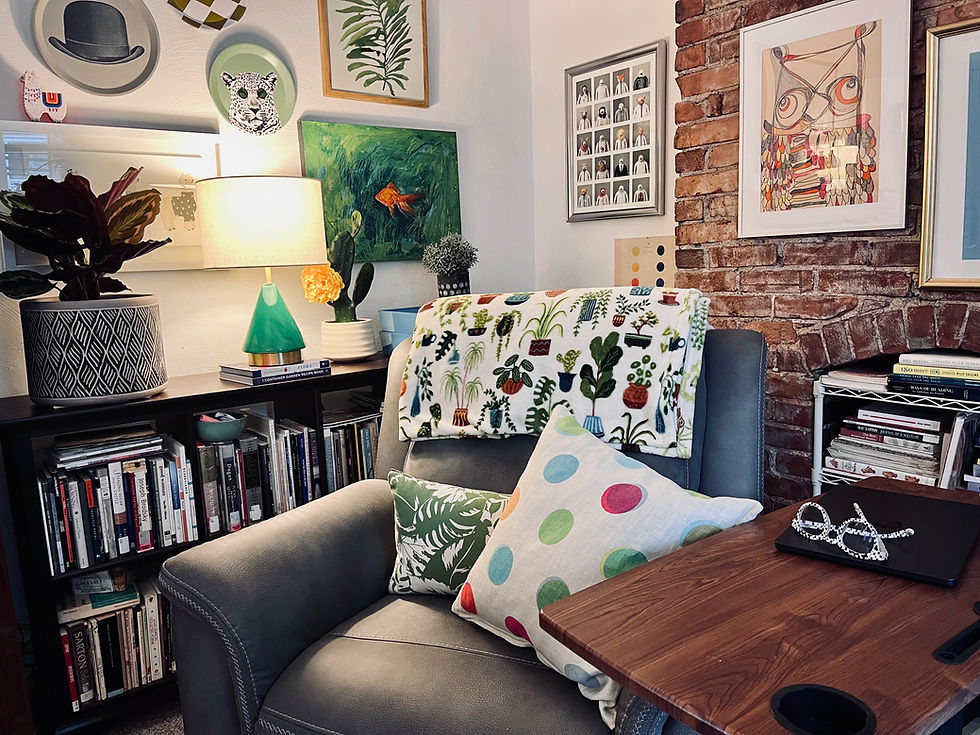Making the Choice to Say Yes: Finding a Way Back to the Writing Life with Poet Jennifer Browne
- leftyblondiepress
- Jun 17, 2025
- 4 min read
Jennifer Browne's poem, "Example Presents Itself," selected as part of the 2025 Lefty Blondie Press Editors' Choice Broadside Series, is now available as a handset letterpress notecard. With humor and openness, Browne shares the influence of her hometown’s beauty on her creative process, how she’s prioritizing her writing life after a long break, and what she wishes poetry could do.
LBP: Do you have a dedicated writing space? What does your writing space look like? What is not included?
JB: Unless my being crouched over a laptop on my side of the couch counts, I don't have a dedicated writing space, but I tend to do my initial drafting / first riffing while walking. Within the past few months, the most deeply fertile place within my home range has been Piney Reservoir, which is frequented by a wealth of migrating birds. Piney is also the domestic water supply for the town in which I live, so it’s always—forgive the urinary implications—flowing through me.

LBP: How has your relationship to writing changed throughout your life? Are there clear demarcations where you knew there was a shift, or have the changes been gradual, subtle?
JB: Although the cause of it was different, like Kelley Beeson (see her wonderful responses to these questions in the 10 March LBP Blog Post “How to Approach Poetry as Play in the Words of Our First Chapbook Winner”), I had a big temporal gap of not really writing. I came back to it through other folks’ generosities (a writing group I had previously belonged to welcomed me back, people turned attentive eyes to my work), but I was still giving myself “outs” of non-productivity.
A few years ago—again through other folks’ generosities—I realized that I needed to give myself permission to prioritize the writing, to give it time and light and breath and to introduce new enrichments into its enclosure, as it were, through solo travel and other self-tending. I started tricking myself into accountability by signing up for generative projects like the Poetry Postcard Fest. In short, that choice to say yes to everything that could be an opportunity translated to other intentionalities of projects and revision and submitting and doing readings and talking to other people as though I were a writer and not solely any of the other terms by which I might define myself.
LBP: What can poetry do?
JB: Thinking about the question of what poetry can do, I opened Heather Cox Richardson’s 4/26/25 Letter from an American, read its first line: “Early yesterday morning, Immigration and Customs Enforcement (ICE) sent three U.S. citizens aged 2, 4, and 7 from Louisiana, including one with Stage 4 cancer, to Honduras when they deported their mothers.”
My first rational thought was poetry can contain a wail. Yes and no. A wail says precisely what it needs to say, but a poem can pause while that wail hangs in the air and begin to put a translating form to it. A poem can be a lamentation. A poem can listen to the echoes of wails across time and use that keening as a kind of meter.
In the recent-human-historical past, a poem could rouse a crowd, could call swords to clanging, could stand beside rows of fresh graves and eulogize the triumphant dead (elsewhere, in some corner, a poem was eulogizing bodies buried in common pits, a poem was longing for the skin-salt of one particular beloved). Humans being what they are, those “sides” are widely interchangeable.
Somehow we’ve found ourselves in a country with a leader who doesn’t harness chariots to the power of poetry, we’ve found ourselves beside and sometimes surrounded by a mob that wouldn’t be moved by it. However relieved I am that “vile, incurable sores” aren’t patriotically poxing poetry’s tongue at the moment, I think it signals something deeply un-human about the current age.
I look around at the poets whom I know, and although some are more beset by feelings of futility (about their work in the current political moment and otherwise) than others, they are doing the work that individual poets always do, which is to engage the world and the words of the world, to make a record of the time through which they move, to try to make some sense of any of the things they think and feel, to observe and voice the specific, and to speak to what is essentially human, even if it takes the form of light across the first green leaves.
I think about how we use poetry, how it rises in our throats during times of need, giving us words for our grief and deepest love, our longing, our fear, our joy, our isolation, our wonder.
I think about the poems I read to my kiddo when he was still small enough to tuck into the safety of my body, his giggling at the silliness of Polkabats and Octopus Slacks, his breaths calming to regularity by the end of “The Owl and the Pussycat.”
And there they are again, the deported children, and in addition to all the things I wish for them, I wish that what a poem could do is give them (and their mothers) solace.
______________________________________________________________

Jennifer Browne falls in love easily with other people’s dogs. She is the author of American Crow (Beltway Editions, 2024) and the poetry chapbooks Before: After (Pure Sleeze Press, 2025), In a Period of Absence, a Lake (Origami Poems Project, 2025), whisper song (tiny wren publishing, 2023) and The Salt of the Geologic World (Bottlecap Press, 2023). Find her work at:




Comments